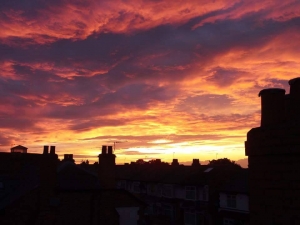I should probably point out that I'm not against the original meaning behind Poppy Day: remembering how Britain twice sent a whole generation of its young men off to be slaughtered, and that future generations should be able to live without the fear of enduring such violence. Yet that meaning often seems to get forgotten as Remembrance Sunday becomes a celebration of jingoism and militarism, where the victims of British aggression in wars past and present are rarely mentioned. It's for this reason that I generally try and have a personal media blackout in the days directly before and after 11 November. Last year I fled the country altogether so as to avoid anything resembling 2011's mawkish campaign on the tube, where those ascending the escalators had to endure images of Helen Mirren telling us how our soldiers are 'the real stars.'
Such displays always remind me of a scene from Mark Twain's short story War Prayer: the one where churchgoers are giving thanks for the heroism and patriotism of their country's servicemen before a stranger claiming to be a messenger from God appears, reminding them of the implicit wish underlying their prayers: that all their enemies will be violently destroyed. After his grim and lurid descriptions of the horrors of war reach an end, the man is quietly ignored. The scene rings true especially when one sees the Church of England decking itself out in Union Jacks every year, which somehow seems far removed from the Biblical command of 'thou shalt not kill.'
As a practicing Christian and a pacifist, I am ideologically opposed to violence. I can appreciate this is a minority position; however I can't accept the notion that I'm duty-bound to show deference for what the armed forces do, largely because it's central to my belief system that state-sponsored violence is hardly more legitimate than any other form.
It's also an oft-ignored difference between current-day conflicts and the two world wars that the young men involved in the latter were conscripted, while today's servicemen and women enter the military out of choice. Although one can't help feeling pity for families that prematurely lose a loved one on the battlefield, that's hardly the same as a ringing endorsement of war. For moral and religious reasons I would never ask anyone to kill or die on my behalf, particularly as the decision to maintain an army is made by the state on behalf of everyone else - including those who would rather opt out. I've often heard it said that politicians are the ones that make the wars, not soldiers. That's certainly true. But it's a condition of being in the army that you might be asked to kill and die, and servicemen and women knowingly consent to that when they sign up. The decision to join is therefore one I can't respect.
Furthermore, there is something especially nauseating about listening to David Cameron lecture the public about being grateful for the British army in light of how Iraq and Afghanistan were political conflicts waged for morally dubious reasons, with it still being hotly contested as to whether the bloodshed and destruction involved has been essential to the national security of anyone. As such, they are not modern incarnations of WW2, although this is always a convenient strategy for politicians in a time of recession and unpopular economic policies. Glorifying the military as forever engaged in a Lord of the Rings-style struggle of good vs. evil, with every foreign enemy lampooned as the next Hitler, glosses over any debate about why wars are fought in the first place - and how they can be prevented.
I appreciate fully the right of anyone to disagree, and I don't wish to deny that there are probably some soldiers that do heroic things. But I do not believe being a soldier is a heroic action in itself, and I can't help but see a danger in allowing unconditional love for the military to so fervently be the modern message of Remembrance. As with any other cause, people have personal reasons for wearing the poppy, yet it should remain just that - something personal. Supporting a charitable campaign, particularly such a politically charged one, should not become a national obligation to be shouted at us from every billboard, bus, train poster and news channel.
The result is that I no longer feel comfortable wearing a poppy. What was meant to be a memento to the truly horrendous nature of war now seems nothing more than a symbol of aggressive nationalism - a reminder that both the media and the government have developed a mentality that sits far too comfortably amid the realities of conflict. If it continues, the moral ambiguities of how and why wars are waged, and the immense sufferings they often cause, risk being permanently forgotten.
http://www.huffingtonpost.co.uk/madeleine-fry/poppy-day_b_4169581.html?u...


I should probably point out that I'm not against the original meaning behind Poppy Day: remembering how Britain twice sent a whole generation of its young men off to be slaughtered, and that future generations should be able to live without the fear of enduring such violence. Yet that meaning often seems to get forgotten as Remembrance Sunday becomes a celebration of jingoism and militarism, - See more at: http://www.therevival.co.uk/forum/general/11352#sthash.ZBotijEF.dpuf
black leather jacket [url=http://www.eleatherjackets.co.uk]black leather jacket[/url]
oracle certification dumps [url=http://www.ibraindumps.com]oracle certification dumps[/url]